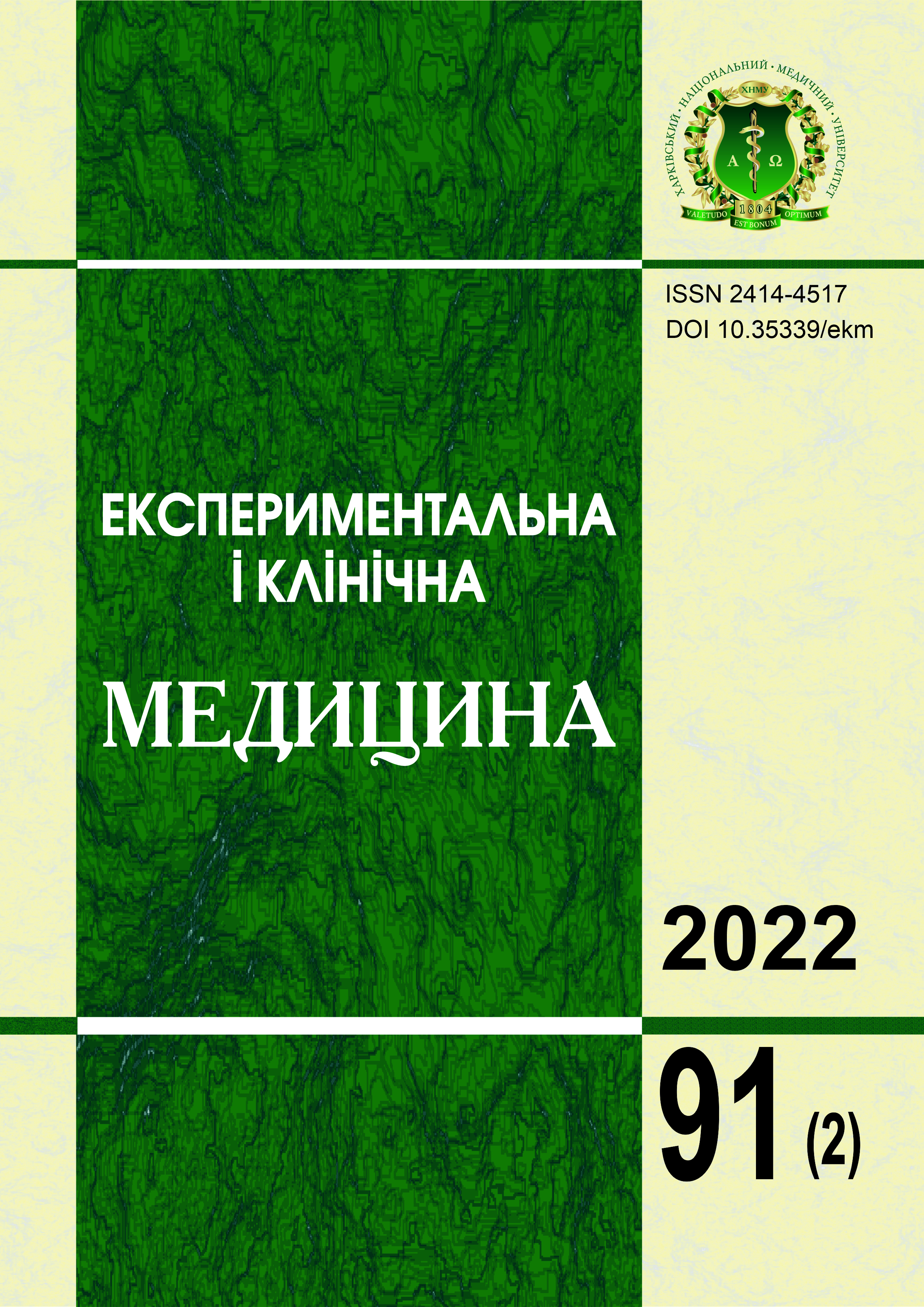Abstract
The aim of the work is to improve the results of surgical treatment of mediogastric malignant tumors complicated by bleeding, perforation and stenosis. During the period 2006–2020, the clinic treated 766 patients with malignant stomach tumors complicated by gastrointestinal bleeding and perforation. Malignant mediogastric tumors were diagnosed in 227 (29.6%) patients, in particular complicated by bleeding – in 212 (93.4%), perforation – in 9 (4.0%), perforation and bleeding – in 6 (2.6%) patients. In total, 106 (46.7%) among 227 patients were operated on, in particular, 13 (12.3%) patients underwent emergency surgery for tumor perforation, and in the group with newly detected cancer operative activity was 48.7% (56 out of 115). Radical operations were performed in 75 (70.8%) patients, palliative and symptomatic – in 31 (29.2%) patients. The total postoperative mortality was 6.6% (7 patients). After radical surgical interventions, 2 (1.9%) patients died, and after palliative and symptomatic operations – 5 (4.7%) (2 (40.0%) of them were operated on for tumor perforation, diffuse peritonitis). It was established that the mortality after emergency operations (22.2%) at the height of ongoing and recurrent bleeding is 4.0 times higher than after operations performed in the early delayed period (5.6%), which are performed after adequate preparation and comprehensive follow-up examination of patients. Therefore operations at the height of bleeding in patients with acutely bleeding malignant mediogastric tumors to be too dangerous, which is associated with high postoperative mortality. In the case of perforation of the tumor, it is advisable to perform palliative or symptomatic surgical interventions at the first stage in order to save the patient's life, followed by delayed (1.5–2 months) radical surgical intervention with lymphodissection D2.
Keywords: malignant stomach’s tumors, endoscopic hemostasis, radical operations, palliative operations, symptomatic operations.
References
Bubnyak MR. Endovascular diagnostic, treatment and prevention of acute gastrointestinal bleedings. [Cand Med Sc dis, spec. 14.01.03 – surgery]. Lviv: Danylo Halytsky Lviv National Medical University; 2019. 179 p. Available at: https://bit.ly/42bbPrn [in Ukrainian].
Kondratenko PH, Smyrnov ML. Hostra krovotecha z novoutvoren travnoho kanalu: taktychni pidkhody [Acute bleeding from neoplasms of the alimentary canal: tactical approaches]. Ukrainian journal of surgery. 2011;10(1):144-9. Available at: http://www.mif-ua.com/archive/article/35426 [in Ukrainian].
Bratus VD. Novyye tendentsii v lechenii bol'nykh s ostrymi zheludochno-kishechnymi krovotecheniyami [New trends in the treatment of patients with acute gastrointestinal bleeding]. Ukrainian Journal of Minimally Invasive and Endoscopic Surgery. 2001;(1):5-6.
Hamashima C. Systematic review group and guideline development group for gastric cancer screening guidelines. Update version of the Japanese guidelines for gastric cancer screening. Jpn J Clin Oncol. 2018;48(7):673-83. DOI: 10.1093/jjco/hyy077. PMID: 29889263.
Melloni M, Bernardi D, Asti E, Bonavina L. Perforated gastric cancer: A systematic review. J Laparoendosc Adv Surg Tech A. 2020;30(2):156-62. DOI: 10.1089/lap.2019.0507. PMID: 31545122.
Jwo SC, Chien RN, Chao TC, Chen HY, Lin CY. Clinicopathological features, surgical management, and disease outcome of perforated gastric cancer. J Surg Oncol. 2005;91(4):219-25. DOI: 10.1002/jso.20307. PMID: 16121341.
Yang K, Liu K, Zhang WH, Lu ZH, Chen XZ, Chen XL, et al. The value of palliative gastrectomy for gastric cancer patients with intraoperatively proven peritoneal seeding. Medicine (Baltimore). 2015;94(27):e1051. DOI: 10.1097/MD.0000000000001051. PMID: 26166075.
Cowling J, Gorman B, Riaz A, Bundred JR, Kamarajah SK, Evans RPT, et al. Peri-operative outcomes and survival following palliative gastrectomy for gastric cancer: a systematic review and meta-analysis. J Gastrointest Cancer. 2021;52(1):41-56. DOI: 10.1007/s12029-020-00519-4. PMID: 32959118.
Kim YI, Choi IJ, Cho SJ, Lee JY, Kim CG, Kim MJ, et al. Outcome of endoscopic therapy for cancer bleeding in patients with unresectable gastric cancer. J Gastroenterol Hepatol. 2013;28(9):1489-95. DOI: 10.1111/jgh.12262. PMID: 23662891.
Schatz RA, Rockey DC. Gastrointestinal bleeding due to gastrointestinal tract malignancy: natural history, management, and outcomes. Dig Dis Sci. 2017;62(2):491-501. DOI: 10.1007/s10620-016-4368-y. PMID 28032204.
Xiong W, Wang W, Wan J. Surgical strategy of diagnosis and treatment for acute perforated gastric cancer. Zhonghua Wei Chang Wai Ke Za Zhi. 2018;21(11):1218-22. PMID: 30506531.
Guideline Committee of the Korean Gastric Cancer Association (KGCA), Development Working Group & Review Panel. Korean Practice Guideline for Gastric Cancer 2018: an evidence-based, multi-disciplinary approach. J Gastric Cancer. 2019;19(1):1-48. DOI: 10.5230/jgc.2019.19.e8. PMID: 30944757.
Shin J, Cha B, Park JS, Ko W, Kwon KS, Lee JW, et al. Efficacy of a novel hemostatic adhesive powder in patients with upper gastrointestinal tumor bleeding. BMC Gastroenterol. 2021;21(1):40. DOI: 10.1186/s12876-021-01611-0.

